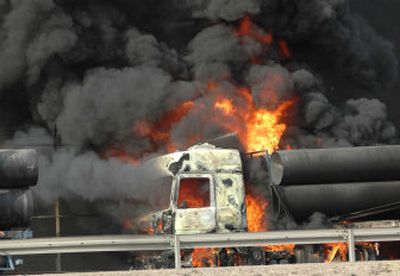Iraqi Sunnis claim fraud in elections

BAGHDAD – Iraq’s largest Sunni Arab alliance charged Tuesday that there was serious fraud in last week’s elections and warned that unless corrective action is taken, the country’s violence could get worse.
The Iraq Accordance Front said in a statement there had been “forgery and the falsification” of ballots. As evidence, the group’s chairman, Adnan al-Dulaimi, cited partial results in Baghdad that showed a Shiite Muslim slate trouncing the Sunni group in the mixed city.
Unless a recount or another action corrects the imbalance, “we will demand that the elections be held again in Baghdad,” he said. “If this demand is not met, then we will resort to other measures.”
The Iraqi elections commission on Tuesday said it had received 1,000 complaints about elections procedures. Of those, 20 are “very serious,” said Farid Ayar, a senior official and spokesman for the commission.
Final results of the Dec. 15 election won’t be released until the complaints are investigated and settled, he said. That would push certification into January. The planned seating of a new government by Dec. 31 will be delayed.
Partial results released by the commission suggest that Iraq’s new, 275-seat parliament will again have a majority or near-majority from the same Shiite religious coalition that controls the current, interim assembly.
The slate, known as the United Iraqi Alliance, is winning overwhelmingly in Iraq’s mainly Shiite southern provinces and even winning some seats in provinces where Shiites are a minority.
The Sunni Arabs, who populate central and western Iraq, boycotted last January’s election. Their strong participation in last week’s vote has been heralded by President Bush and other officials as a sign of democratic progress in Iraq.
With 89 percent of the vote counted in the capital, which also is Iraq’s most populous province, the Shiite United Iraqi Alliance had nearly 59 percent, compared with the Sunni list’s 19 percent.
U.S. Ambassador Zalmay Khalilzad warned Tuesday that the voting along ethnic and religious lines could affect efforts to move forward after more than two years of war and lead to an even more dangerous problem: civil war. “Sectarianism undercuts prospects for success and increases the risk for conflict among sects,” he said.
Suspicions of election fraud have permeated the Sunni community since a news report last week, denied by the government, that a truckload of counterfeit ballots was seized at the Iranian border.